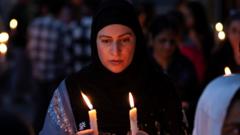A surge in anti-Kashmiri sentiments has left many in fear for their safety, as the recent incident has sparked harassment and assaults against individuals identified by their ethnicity.
**Kashmiris Face Rising Violence Amidst Tensions in India**

**Kashmiris Face Rising Violence Amidst Tensions in India**
Kashmiris living in India are increasingly becoming victims of violence following a deadly attack that claimed numerous lives.
Despite being celebrated for their craftsmanship, recent events have cast a shadow on the lives of Kashmiris living in India. Shabir Ahmad Dar, a seasoned pashmina shawl seller, has found his identity turning from a point of pride into a source of fear. Last week, he and a fellow vendor were attacked in Mussoorie, a hill town in Uttarakhand, by members of a right-wing group incensed over a violent incident that occurred in Kashmir. The attack claimed 26 lives, leading to widespread outrage across India and accusations against Pakistan.
When the assailants confronted Dar, they blamed him for the killings, demanding his expulsion from the town. The incident sent shockwaves through the Kashmiri community in Mussoorie, culminating in a mass exodus for those fearing a repeat of such violence. Dar, like many of his counterparts, left behind his goods, unable to return due to fear for his life.
In the aftermath of the attack, security has intensified in Indian-administered Kashmir, with law enforcement detaining suspected militants and amplifying their presence in the region. However, this has raised alarms among civilians regarding the potential for collective punishment. Many Kashmiris, already on edge, are now facing a heightened sense of vulnerability as they navigate everyday life.
Reports of increased instances of harassment against Kashmiri vendors and students in various cities have emerged. These troubling incidents illustrate how quickly the atmosphere can shift from camaraderie to hostility based on recent events. In Punjab, nursing student Ummat Shabir described the dehumanizing experience of being labeled a "terrorist" by her peers, further compounding the fear that Kashmiris feel in different parts of India.
Despite these harsh realities, there are calls for unity and peace, as a surviving family member of the Pahalgam attack insisted that targeting innocent Kashmiris is counterproductive. Yet, many have no choice but to return home, where the situation is still fraught with uncertainty.
Amid ongoing military operations aimed at quelling any further violence, the government has come under scrutiny for its approach, especially concerning the demolitions of homes linked to suspected militants. Critics and officials alike are calling for a distinction between combating terrorism and punishing civilians without due cause.
Kashmir remains a delicate situation, caught between national politics and local suffering. A recent surge in violence has only deepened the suspicion faced by those living in the region, renewing fears that Kashmiris will continue to be seen through a lens of doubt and hostility. Thus, many endure the pain of living under constant scrutiny while longing for a return to peace, both within their communities and across the nation.
When the assailants confronted Dar, they blamed him for the killings, demanding his expulsion from the town. The incident sent shockwaves through the Kashmiri community in Mussoorie, culminating in a mass exodus for those fearing a repeat of such violence. Dar, like many of his counterparts, left behind his goods, unable to return due to fear for his life.
In the aftermath of the attack, security has intensified in Indian-administered Kashmir, with law enforcement detaining suspected militants and amplifying their presence in the region. However, this has raised alarms among civilians regarding the potential for collective punishment. Many Kashmiris, already on edge, are now facing a heightened sense of vulnerability as they navigate everyday life.
Reports of increased instances of harassment against Kashmiri vendors and students in various cities have emerged. These troubling incidents illustrate how quickly the atmosphere can shift from camaraderie to hostility based on recent events. In Punjab, nursing student Ummat Shabir described the dehumanizing experience of being labeled a "terrorist" by her peers, further compounding the fear that Kashmiris feel in different parts of India.
Despite these harsh realities, there are calls for unity and peace, as a surviving family member of the Pahalgam attack insisted that targeting innocent Kashmiris is counterproductive. Yet, many have no choice but to return home, where the situation is still fraught with uncertainty.
Amid ongoing military operations aimed at quelling any further violence, the government has come under scrutiny for its approach, especially concerning the demolitions of homes linked to suspected militants. Critics and officials alike are calling for a distinction between combating terrorism and punishing civilians without due cause.
Kashmir remains a delicate situation, caught between national politics and local suffering. A recent surge in violence has only deepened the suspicion faced by those living in the region, renewing fears that Kashmiris will continue to be seen through a lens of doubt and hostility. Thus, many endure the pain of living under constant scrutiny while longing for a return to peace, both within their communities and across the nation.






















